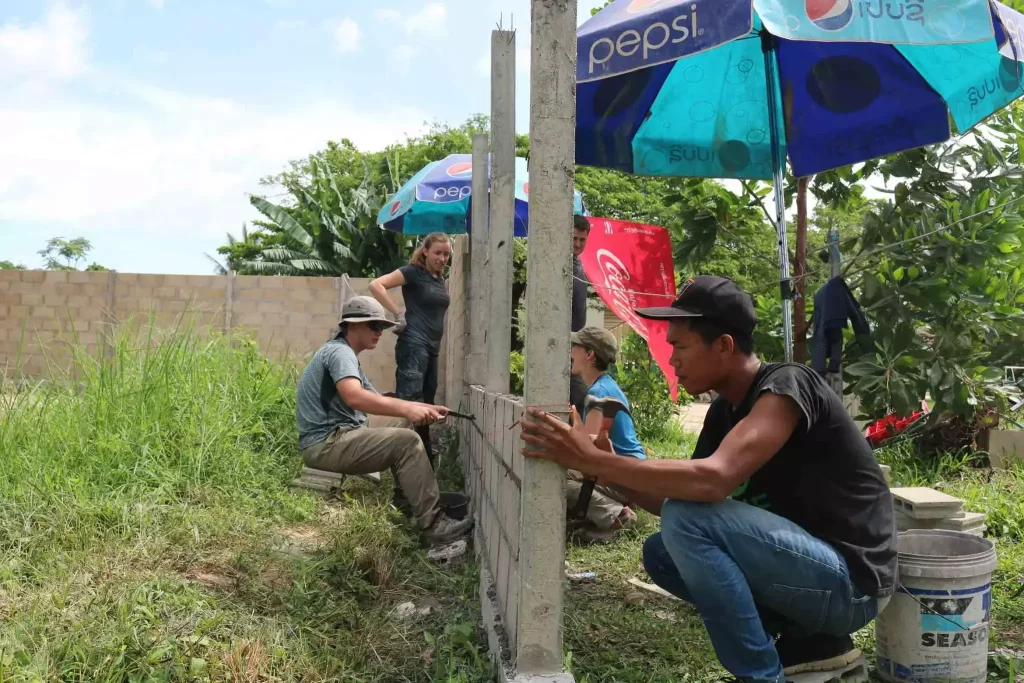Volunteering is a dedication which involves donating your time and skills to a particular cause or organisation. There are countless volunteer opportunities available, ranging from local community organisations to global humanitarian efforts. Volunteering has been shown to have numerous benefits, including the enhancement of personal well-being. In this blog post, we will explore the relationship between volunteering and happiness, personal development, and mental health. We will also provide tips for getting involved in community service and maximising the benefits of volunteering for well-being.
The Relationship Between Volunteering and Happiness
Volunteering has been found to lead to increased happiness and well-being. This is due in part to the social interaction that comes with volunteering. When individuals engage in volunteer work, they often have the opportunity to connect with others who share their passion and interests. These connections can lead to a greater sense of community and belonging, which can contribute to feelings of happiness and fulfilment. When volunteering abroad you have the chance to meet people from every corner of the globe and learn about different traditions and lifestyles, which can make for a great cultural exchange.
Additionally, volunteering provides individuals with the opportunity to make a positive impact on the world around them. When individuals feel like they are making a difference, they often experience feelings of joy and contentment.
Positive psychology research has also found that acts of kindness, such as volunteering, can lead to an increase in overall well-being. This is because acts of kindness are associated with positive emotions such as compassion and empathy. When individuals engage in acts of kindness, they often experience a sense of purpose and meaning, which can contribute to feelings of happiness and fulfilment.
Volunteering for Personal Development
In addition to enhancing happiness and well-being, volunteering can also promote personal development. By volunteering, individuals can develop new skills, such as leadership, communication, and problem-solving. Volunteer work can also help individuals build qualities such as empathy, compassion, and resilience. These skills and qualities can not only benefit personal growth, but also career development.
For example, an individual who volunteers for a non-profit organisation may develop skills in fundraising, event planning, and grant writing. These skills can be transferable to a career in the non-profit sector or in other fields. Similarly, an individual who volunteers for a tutoring program may develop skills in teaching and mentoring, which can be transferable to a career in education or other fields.
Volunteering and Mental Health
Volunteering can also have a positive impact on mental health. Studies have found that volunteering can reduce symptoms of depression and anxiety. Engaging in community service can provide individuals with a sense of purpose and meaning, as well as a sense of connection to others. This can help combat feelings of loneliness and isolation.
However, it’s important to note that finding the right volunteer opportunity is key. Not all volunteer work may be suitable for individuals with mental health conditions. It’s important to find an opportunity that aligns with personal interests and values, and that does not cause undue stress or anxiety.
Getting Involved in Community Service
There are many different types of volunteer opportunities available, from animal shelters to environmental conservation to medical outreach programs. To find the right volunteer opportunity, it’s important to consider personal interests and values. Volunteer work should align with one’s passions and beliefs, as this can lead to a greater sense of joy and purpose.
It’s also important to consider time constraints and availability, as well as any necessary skills or qualifications. For example, an individual who works full-time may prefer volunteering short-term. IVI projects start from one week, which allow those with little time to still contribute to important causes.
Enhancing Well-being Through Volunteering
To maximize the benefits of volunteering for well-being, it’s important to find activities that align with personal interests and values. For example…
Set realistic expectations: It’s important to have realistic expectations about the impact that volunteer work can have on personal well-being. While volunteering can enhance happiness and personal growth, it’s not a cure-all for mental health conditions or other issues. It’s important to approach volunteering with a positive attitude and an open mind, but to also be aware of personal limitations.
Connect with others: One of the key benefits of volunteering is the social connection it can provide. To maximize this benefit, it’s important to engage with other volunteers and community members. This can include attending volunteer events, participating in group activities, or simply striking up a conversation with others. By building relationships with others, individuals can enhance their sense of community and belonging.
Take care of yourself: While volunteering can be fulfilling, it’s important to also prioritise self-care. This can include getting enough sleep, eating a balanced diet, and engaging in regular exercise. It’s also important to recognise when volunteer work is becoming too stressful or overwhelming, and to take a break or seek support as needed.
Reflect on the experience: To fully appreciate the benefits of volunteering, it can be helpful to reflect on the experience. This can include journaling about personal experiences, discussing volunteer work with friends or family members, or simply taking time to appreciate the positive impact that has been made. By reflecting on the experience, individuals can enhance their sense of purpose and meaning.
Volunteering Abroad: Benefits and Considerations
While volunteering in one’s local community can have numerous benefits, volunteering abroad can offer a unique set of advantages. From cultural immersion to skill development, volunteering abroad can enhance personal growth and contribute to global efforts to address social and environmental challenges.
Cultural immersion: Volunteering abroad offers the opportunity to immerse oneself in a new culture and gain a deeper understanding of different perspectives and ways of life. By working alongside local communities and engaging in cultural activities, volunteers can broaden their horizons and develop greater empathy and respect for others.
Skill development: Volunteering abroad can also offer opportunities to develop new skills or hone existing ones. For example, volunteering in a healthcare setting can provide valuable experience for those pursuing a career in medicine, while volunteering in a construction project can develop skills in building and engineering.
Language learning: Volunteering abroad in a country where a different language is spoken can offer the opportunity to learn or improve language skills. By working alongside local community members and practicing language skills in real-world situations, volunteers can develop greater proficiency and cultural understanding. Our programs in Peru, Guatemala and Costa Rica all allow for extra Spanish lessons which can be a fantastic way to learn the language, as you get to practice your new skills with the locals!
Global impact: Volunteering abroad can contribute to global efforts to address social and environmental challenges. By supporting local organisations, NGO’s and community initiatives, volunteers can make a tangible difference in the lives of others and contribute to sustainable development goals.
While volunteering abroad can offer numerous benefits, it’s important to approach this experience with consideration and awareness of potential challenges. Considerations include:
Cultural differences: Volunteers may encounter cultural differences that can be challenging or uncomfortable. It’s important to approach these differences with openness and respect, and to be willing to learn and adapt to new cultural norms. Reading up about the culture before you visit is a good way to know what to expect so things are less of a culture shock once arrived at your destination.
Ethical considerations: Volunteering abroad can present ethical considerations, such as perpetuating a “saviour” mentality or imposing Western values on local communities. It’s important to approach volunteer work with humility and respect, and to prioritise the needs and perspectives of local communities.
Conclusion
Volunteering is a powerful way to enhance personal well-being while making a positive impact on the world around us. By engaging in volunteer work, you can enhance your happiness, personal growth, and mental health. To make the most of volunteering, find opportunities that align you’re your personal interests and values, to connect with others, and to prioritise self-care. By doing so, you can enhance your sense of purpose and meaning, and make a positive impact on local communities.
 Involvement Volunteers International
Involvement Volunteers International 




